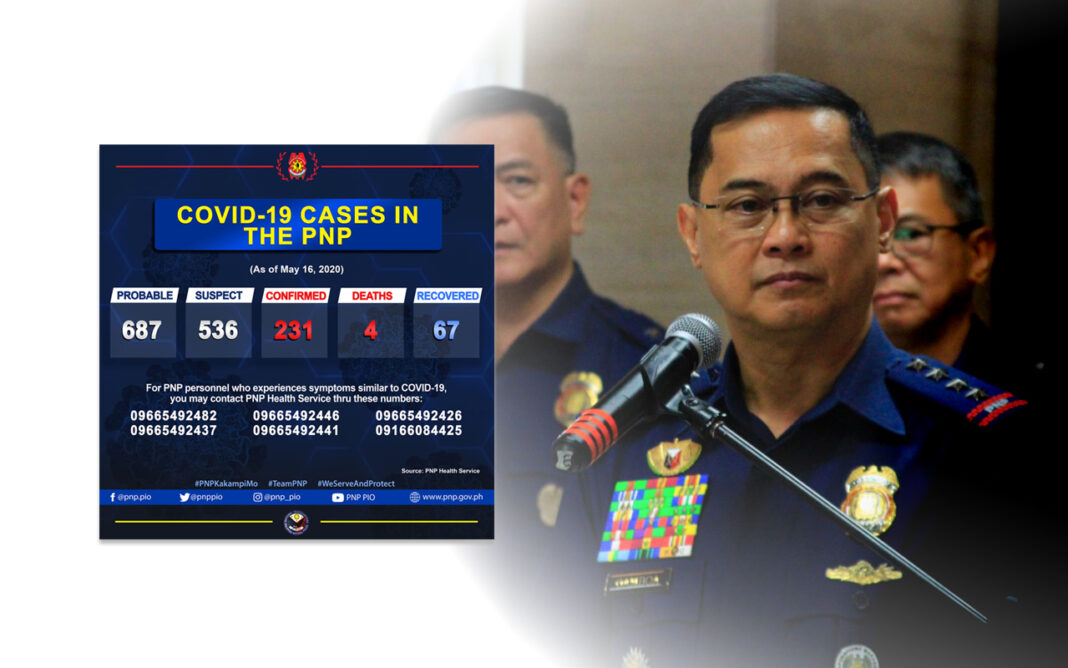On May 16, the Philippine National Police (PNP) said 17 more police officers added to confirmed cases of COVID-19 among their ranks, bringing the total infections to 231.
The PNP Public Information Office (PIO) said in a statement that all of the new cases were assigned in the National Capital Region (NCR).
PNP TALLIES 17 MORE PERSONNEL INFECTED WITH COVID-19, TOTAL OF 231 CONFIRMED CASESThe Philippine National Police…
Geplaatst door Philippine National Police op Zaterdag 16 mei 2020
The PNP PIO reported that among the 231 cases, 116 patients are in quarantine facilities, seven are admitted in hospitals, and 35 are undergoing home quarantine.
The police force remained optimistic on recoveries among police.
“The [PNP] has maintained a high recovery rate of COVID-19 cases among police frontliners, the PNP Health Service said in its latest report. Health Service noted that the PNP is now posting 30.84% recovery rate with 66 patients out of 214 cases since March 2020 now recovered from the infection,” the PNP PIO said on May 15.
Rising cases among police, lockdown of camps
The PNP reported 164 cases on May 12 that rose to 179 cases on May 13 when 15 new cases were added. It rose to 204 by May 14 with 35 new cases. Ten cases were reported on May 15, bringing total to 214.
The Quezon City Police District (QCPD) headquarters Camp Karingal was placed under lockdown on May 9, after 14 cops tested positive. The lockdown was only announced to the public only on May 11. Of the 14 who tested positive, one is a member of Joint Task Force NCR and 13 are QCPD cops. Ten are based in Camp Karingal, while the other 3 are assigned to different police stations. Entry and exit to and from the camp was prohibited from 5pm on May 9, until 5 pm on May 12. Testing were conducted for 219 personnel out of the 1,563 population in the camp. The 115 results released already turned up 14 positive.
The Eastern Police District (EPD) headquarters in Pasig City was placed under lockdown from May 13 to 17 after at least 20 of its police officers tested positive for COVID-19.
Rising cases among police may make them super spreaders are they are scattered all over the metro, said Youth Movement Against Tyranny convenor Paco Perez.
Police as super spreaders?
The police force deployed on the ground to man checkpoints and border control points and enforce lockdown rules are also considered as frontliners.
Perez averred that “the police have been serving as frontliners to Duterte’s militaristic lockdown.
“Many reported abuses from incidents of torture such as standing under the sun or being brought to a cemetery to be berated, beating up violators including a recent case in Cavite accusing police of beating up a factory worker who reported sustained a fracture and Winston Ragos being shot dead,” said Perez.
People also questioned the recent spate of arrests over charges of “fake news” made by police and other law enforcement authorities, with the recent ones argued as only expressing their opinion or what is within the bounds of free speech.
Perez maintained that also during the performance of PNP’s duty, “it is unfortunate that they now experience increasing cases of COVID-19 among their ranks.”
The group raised the alarm that the police are “super spreaders” following the birthday party for NCR Police Office chief Major General Debold Sinas.
“These policemen are those who people encounter at checkpoints and are allowed to roam freely within the areas under lockdown. They are spreaders of the disease as COVID-19 cases among police rise and they even had to gather for a party for Sinas,” said Perez.
Calls for mass testing
Perez said the ‘pasaway’ narrative has been conveniently used to deflect blame on the people for the repeated lockdown extension. The enhanced community quarantine (ECQ) in NCR has shifted to modified ECQ from May 16 to 31, with “stay at home” still a strict general rule the police would enforce.
But he said it is the continued rise in cases and the lack of mass testing that prevented identification of clusters of transmission and breaking them to stop the spread of the disease.
Perez said that more people were “authorized persons outside residence” in the police jargon (one per household allowed to go out to buy essentials), than the more than 100,000 curfew and quarantine violators the police reported to have apprehended by April.
Perez enumerated that during the ECQ from March 17 to May 15, “in NCR alone there would be at least three million allowed to go out to get their own supplies because government did not assure they would make ends meet. They said there were also 100,000 police and military deployed in areas under lockdown. There are also more than 10,000 or more media workers that PCOO accredited. There are also the workers who are among those deemed essential allowed to go out. Add to that number the medical professionals and workers in the health sector in the true frontlines in this pandemic.”
NCR has 3.1 families as of the 2015 Census, according to the Philippine Statistics Authority.
Perez also highlighted that the Department of Health (DOH) data would also show that cases are prevalent among health workers.
“Even the DOH data showed that almost one of five COVID-19 cases are health workers. There are also many in jails–-people deprived of liberty who did not go out of their premises. There are also many cases in the police. So there is no basis to the pasaway narrative. There remains only a lack of mass testing after two months of lockdown,” said Perez.
As of Saturday, the DOH reported 12,305 COVID-19 confirmed cases, of whom 817 died and 2,561 others recovered, according to the Department of Health. Positive individuals, however, were reported at 16,393 by May 13. DOH explained that the difference in positive and confirmed cases are those the agency is still verifying.

































